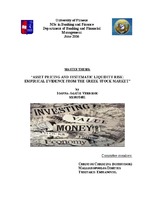Asset princing and systematic liquidity risk : empirical evidence from the Greek Stock Market

Master Thesis
Συγγραφέας
Βερροίου, Ιωάννα-Αγαθή
Ημερομηνία
2007-07-13Προβολή/
Θεματική επικεφαλίδα
Διατριβές ; Capital assets pricing model ; Financial riskΠερίληψη
The main purpose of this paper is to examine the significance and magnitude of systematic liquidity risk pricing in the Greek stock market. The motivation for this study was provided by the growing interest in liquidity that has emerged in the asset pricing literature over the recent years. It should be pointed out that besides the recent and relative scant evidence from the U.S. market, there is no evidence regarding the importance of liquidity for asset pricing in the European markets except for the paper of Martinez, Nieto, Rubio and Tapia (2004) who result that systematic liquidity risk is significant priced in the Spanish stock market. For this reason this paper investigates whether market-wide liquidity is a state variable important for asset pricing in the Greek stock market. We analyze whether expected returns of the Greek market are associated cross-sectionally with betas estimated relative to two competing liquidity risk factors. The first one, proposed by Pastor & Stambaugh (2001), is associated with the temporary price fluctuation reversals induced by the order flow (OFL) and the second is the illiquidity ratio (ILLQ), as suggested by Amihud (2002) which is based on the price response to one euro of trading volume. We employ four alternative pricing models: the traditional CAPM, the three-factor Fama and French model and the two CAPM liquidity-based models, in which we add the liquidity factor (either OFL or ILLQ) to the standard CAPM model in order to examine the relation between the liquidity and expected returns.


